by Jivana (with photos by Sarit Z Rogers)

Sun Salutations (Surya Namaskar) are an effective way to warm up your entire body, whether for preparing to do more poses or simply for warming yourself up on a cold morning. It’s also a powerful practice on its own that can help you connect with your breath and the rhythmic movements of nature. By coordinating your breath and movement you engage your mind in the practice, and keeping your mind quiet for even a short time can be surprisingly refreshing and relaxing.
Sun Salutations can be made more accessible in a number of ways. You can either practice a variation of a traditional Sun salutation series by adapting the individual positions it includes or you can remove poses or sections of the series that present the greatest challenge. Other ways to vary the sequence include using props, such as a wall or chair.
Practicing with a wall is extremely helpful if you don’t want to get on the floor or you can’t easily reach the floor with your hands. This can also be useful if you don’t want to put weight on your knees, want to reduce the weight on your wrists or shoulders, or if you’re in an airport and don’t want to touch the floor! It’s also useful for pregnant women because it eliminates pressure on the belly.
If you don’t have wall space available, or if you want to avoid bending your wrists, the same series I’m presented below for practicing Wall Sun Salutations can be done using the back of a chair instead. But make sure that the chair is very stable, either by placing it against a wall or on top of a yoga mat, or both. This series can be adapted to match whatever version of Sun Salutation you practice by using the wall the same way as you would use the floor. For example, you could replace one of the Wall Downward-Facing Dog poses with a Wall Plank Pose. Use your creativity, and remember the key element is combining the movements with your breath.
To prepare, place your mat perpendicular to a wall, with one of the short edges of the mat touching the wall.
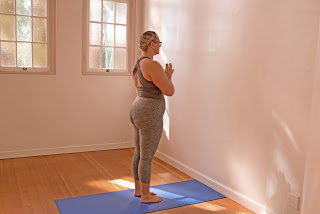
1. Full Breath in Mountain Pose (Tadasana): Stand in Mountain Pose facing the wall, slightly further than arm’s length away, with your feet hip width apart. Inhale and bring your palms together in front of your chest. Then exhale.
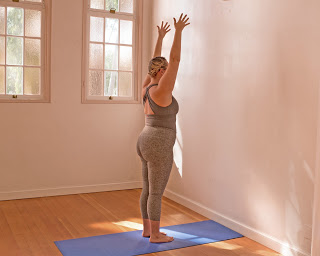
2. Inhale into Arms Overhead Pose (Urdva Hastasana): Raise your arms overhead as you look up gently, without straining your neck.
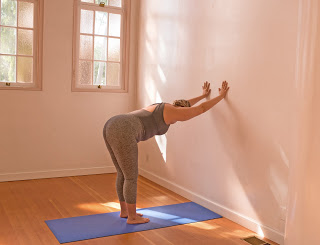
3. Exhale into Wall-Supported Downward-Facing Dog Pose (Arda Adho Mukha Svanasana): Hinge forward from hips hips, placing your palms on the wall just above waist height.
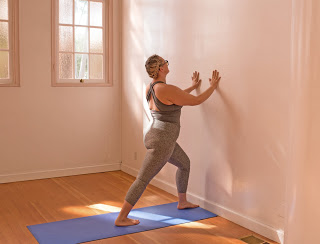
4. Inhale into Lunge Pose (Anjanayasana): Step your left foot forward, bringing your toes up to the wall and bending your left knee. Keep your right leg straight. Press the chest away from the wall and lengthen your spine upward. Look up slightly.
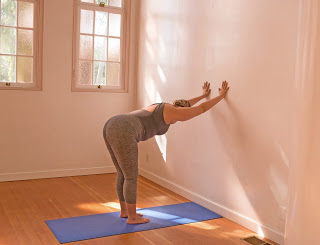
5. Exhale into Wall Downward-Facing Dog Pose: Exhale and step your left foot back to parallel with your right foot and hip width apart.
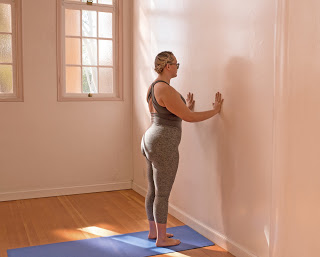
6. Inhale into Wall Plank Pose: Raising your torso, step both feet forward, halfway to the wall and bend your arms slightly.
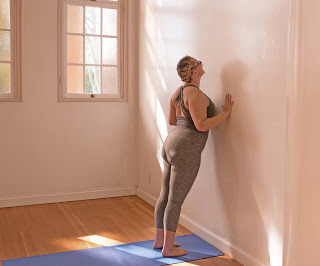
7. Exhale into Wall Cobra Pose (Bujanghasana): Bend your arms and press your chest and chin toward the wall, coming into a slight backbend. Keep your neck long without dropping the head back.

8. Inhale into Wall Plank Pose: Release your head and press into your hands to come out of Wall Cobra.

9. Exhale into Wall Downward-Facing Dog Pose: Step both feet back and hinge forward into Wall Dog.
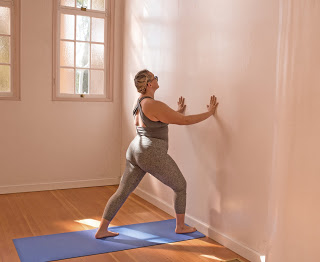
10. Inhale into Lunge Pose: Step your right foot forward and bend your right knee, keeping your left leg straight. Press the chest away from the wall. Lengthen the spine, looking up gently.

11. Exhale into Wall Downward-Facing Dog Pose: Step your right foot back to parallel with your left foot hip width apart.

12. Inhale into Arms Overhead Pose: Raise your head and push off from the wall, keeping your arms lifted overhead to return to Arms Overhead pose. Look up gently.
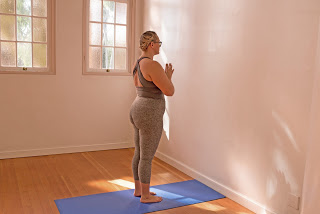
13. Exhale into Mountain Pose: Release your arms and bring your palms together at the chest.
Follow Jivana Heyman on Facebook and Instagram and see Jivana’s Workshops and Trainings for upcoming workshops and trainings. For information on Accessible Yoga, see accessibleyoga.org and follow Accessible Yoga on Facebook and Instagram.
Follow Yoga for Healthy Aging on Facebook ° To order Yoga for Healthy Aging: A Guide to Lifelong Well-Being, go to Amazon, Shambhala, Indie Bound or your local bookstore.


Leave A Comment